
Our reporter Go Hatori finds out!
If you’re looking for a natural hot spring vacation in Japan, one of the best places you can go is Beppu in Oita Prefecture, on the southwestern island of Kyushu. The unique geological environment of the city has allowed eight separate hot spring zones to develop naturally in the area, according to a surprisingly detailed promotional video for the city.
The result is that hot springs are everywhere in the town, and many of them have different kinds of water. That’s also why, when it comes to at-home bath salts, some of the most popular and the most common varieties try to replicate the qualities of Beppu’s hot springs. Our Japanese-language reporter Go Hatori learned this when he did an in-depth investigation into bath salts. But which ones actually give an authentic Beppu-like quality to your at-home bath? He collected 11 different kinds from popular bath salt brands and decided to test each one out.
But in order to know what Beppu onsen are really really like, you’d have to travel to Beppu, right? So Go hopped on a quick flight to Beppu to stay in a ryokan and try out three different kinds of onsen. The first he tried was a clear-water, sodium chloride onsen at Nihon Ryokan Utsuwa Beppu Kannawa, the ryokan where he stayed.
The second one was a strongly acidic medical hot spring said to have the highest iron ion content in all of Japan, called Tsukahara Onsen.
And the last was a mud bath smelling strongly of sulfur called Konya Jigoku.
Of course, Beppu has far more onsen than just those three, but Go figured they were enough to get a feel for “Beppu-style” onsen and properly judge the Beppu-style bath salts he’d collected. With the memory of the onsen embedded in his heart and mind, Go returned to Tokyo.
Once back in the capital he tried a different Beppu-style bath salt every day…
And managed to pick a “Most Beppu-like Bath Salt” top three!
The criteria he judged it on was simply the question “How Beppu is this bath?”, so the results reflect Go’s personal experiences in Beppu. But they were determined by Go’s body and heart as well as his mind, so you may consider them to be as accurate as he could possibly make them.
Top 3 (In No Particular Order) Pick #1: Beppu Myoban Onsen Yu no Hana by Okamoto-ya
These bath salts are serious. They’re not messing around. They not only made the water nice and green like a proper natural onsen, but the taste of the water was really similar to that of the high-acid Tsukahara Onsen. It also had a faint sulfuric smell. It was like if the mud bath of Konya Jigoku and the onsen of Tsukahara Onsen had a baby, like being in Beppu in person! Go was impressed.
Top 3 (In No Particular Order) Pick #2: Yuyaku by Young Venus
This bath salt was a white, cloudy water variety. The resulting water really had a good, authentic onsen vibe to it. It was slightly viscous, giving it a similar feel to the mud bath. With a nice floral composition, it really gave off the sense of a Beppu bath. Plus, it gets points for making the floor authentically slippery. High marks.
Top 3 (In No Particular Order) Pick #3: Yakuyo Yu no Hana by Murakami Shoukai
This one really sought to reproduce the real deal! It was extremely close to what Go experienced in Beppu. It didn’t smell too sulfuric, but Go couldn’t help but feel it was super similar to Tsukahara Onsen. It also looked like it would have a strong acidic flavor to it, though when Go tasted it, it was flavorless. Still, it was a seriously Beppu-like bath salt.
These three were the most Beppu-like bath salts that Go tried, and you can’t go wrong with either one of them if you want an authentic onsen-like experience at home. However, Go did try the other eight kinds and took notes, so, if you like, you can reference his opinions when planning your own home bath.
Close but No Cigar #1: Roten no Yado by Fuso Chemical Co.
This one smelled really good! It didn’t smell like a real onsen, but it had the right feel to it. It was a viscous, cloudy, white-water-style bath that felt like a mud bath. It did say explicitly on the package, “This product is not meant to replicate the waters of an onsen”, but it gets points for atmosphere.
Close but No Cigar #2: Nihon no Meiyu by Bathclin
Since Go had been to Beppu before this trial, he understood what these bath salts were trying to do. The resulting water didn’t smell sulfuric like an onsen and or have the same water quality, but even so, Go could tell that they tried to get close to the feel of a mud bath. Points for effort on this one.
Runner-up #1: Tabi no Yado by Kracie
It was green! And it was clear! It also had a kind of refreshing smell. But it was completely unlike the onsen in Beppu, so it was a bit of curveball for Go. He thought maybe they’d tried to make a medicinal style bath….but it was all wrong.
Runner-up #2: Runrun no Yu (Moto) by Young Venus
It seemed like a serious bath salt since it was unscented, but for a layperson like Go, maybe it was too realistic? He couldn’t tell if it was good or bad, or even Beppu-like for that matter. The water did have a Beppu-like viscosity to it, but it seemed like it was working so hard to imitate Beppu hot spring waters that Go couldn’t tell if it succeeded or not. Like a professional mimicker: you can see through the farce, but it’s still somewhat convincing. Anyway, Go supposes this one is for onsen experts only.
Runner up #3: Ii Yu Tabidachi by Hakugen Earth
It was purple?! It had a faint aroma of brilliantly blooming cherry blossoms, so Go wondered if they were trying to make a spring-themed product. While it was interesting, it was completely unlike anything Go experienced in Beppu, and so it got failing marks. Perhaps if Go had gone in spring…
Runner up #4: Magma Onsen Beppu (Umi Jigoku) by JPD Co. Ltd
And this one was blue. The name “Umi Jigoku” means “Sea Hell” and refers to the too-hot-for-humans, surface-level hot spring that is bright blue like a tropical ocean, which is a popular tourist spot in Beppu. The name is well-represented by the color, but the refreshing smell did not seem to match the actual hot spring. Apparently, it was made using powder derived from the hell spring itself, but if you didn’t read the package, you’d never know that. Perhaps this is the kind that is powered by ingredients and not necessarily by the intended experience.
Runner up #5: Bath Relief Yuyado Meguri Medicinal Bath Salts by Lion Chemical
This one was also purple for some reason. Go began to wonder where in Beppu they had purple onsen. In any case, these bath salts may have been medicinal, but they didn’t give the waters any Beppu-like feel. They also didn’t produce any kind of smell or taste. It just felt like a purple bath.
Runner-up #6: Meiyu Hyakkei by Goshu Yakuhin
Another purple one! This one smelled like a typical bath salt, and in fact it really didn’t feel like an onsen bath at all. As Go was thinking this, he saw that the package said, “This product is not meant to be a replication of hot spring waters.” Oh. Well, that explains it.
While these bath salts are good under-the-mark substitutes, for the most authentic Beppu hot spring experience, you clearly have to go there yourself. However, if you’re really determined to experience Beppu onsen without traveling, there is one more option: a rentable inflatable bathhouse that even comes with hot spring water sourced directly from Beppu. Where there’s a will, there’s a way!
Images © SoraNews24
● Want to hear about SoraNews24’s latest articles as soon as they’re published? Follow us on Facebook and Twitter!

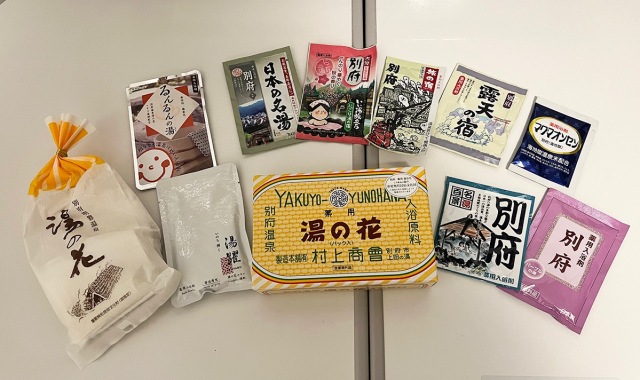
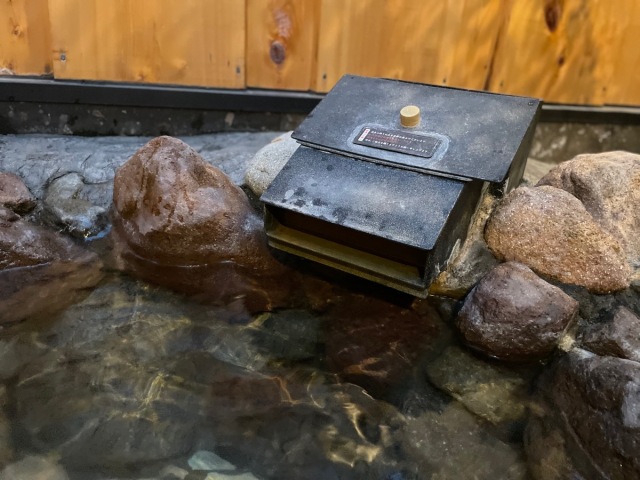
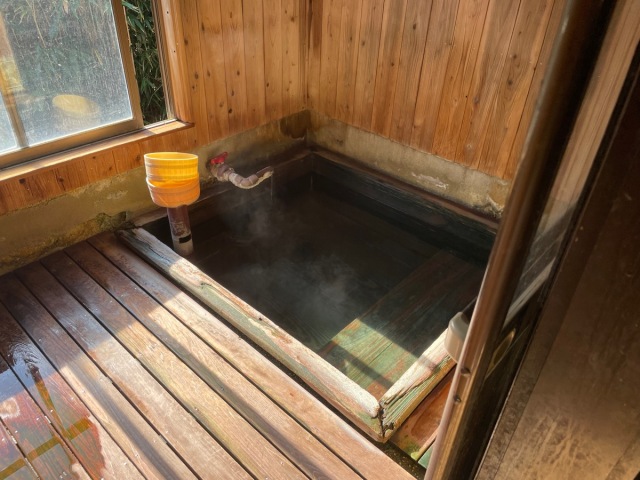
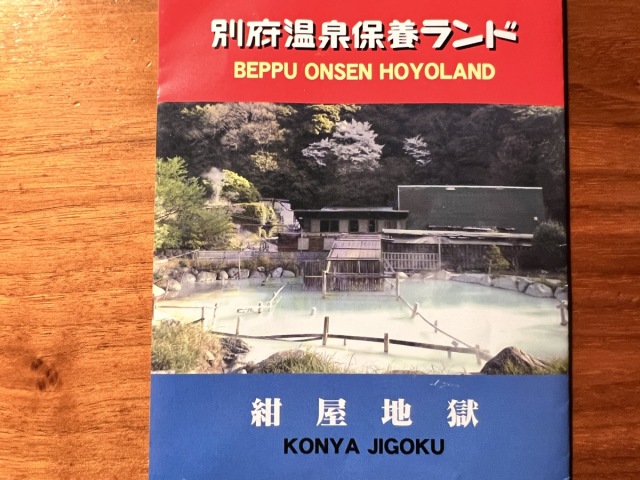
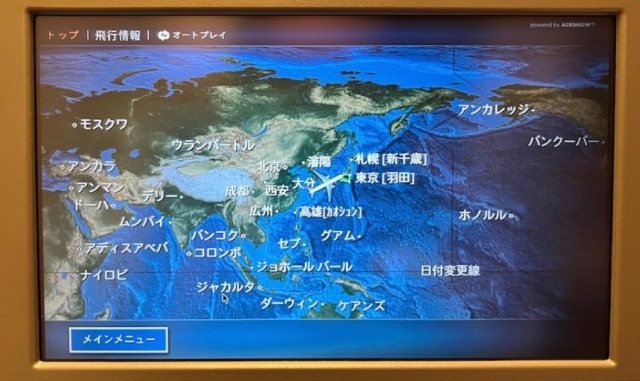
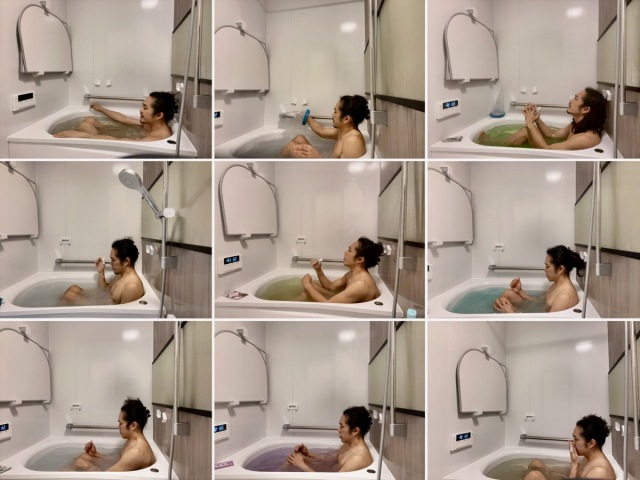
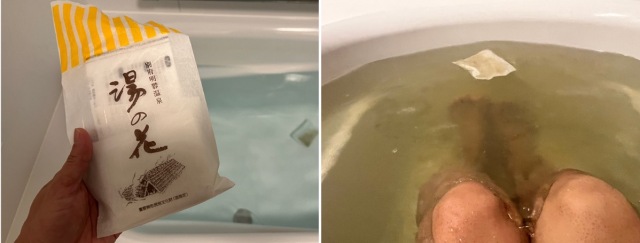
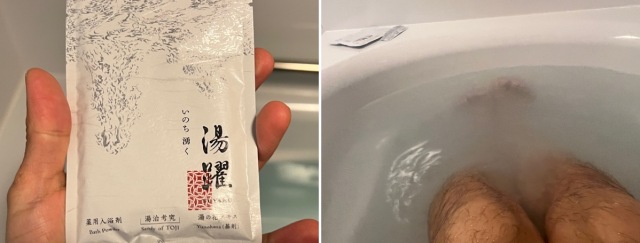
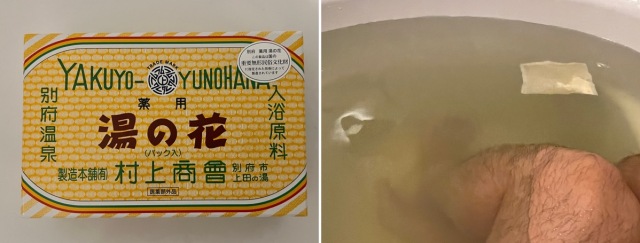
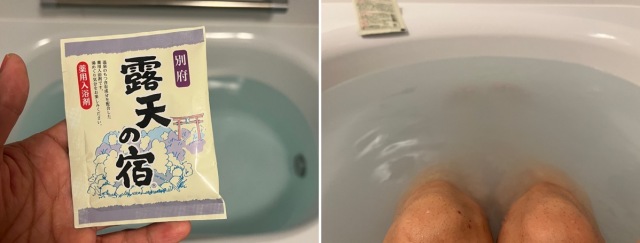
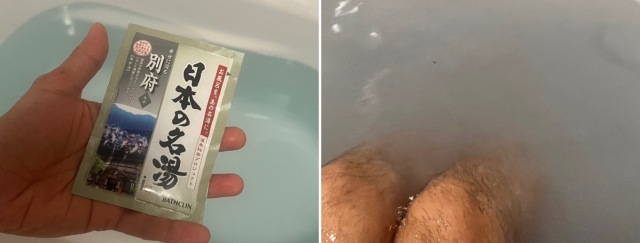
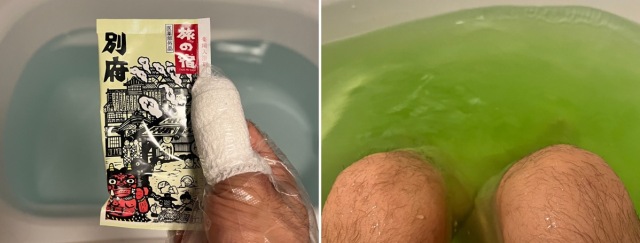
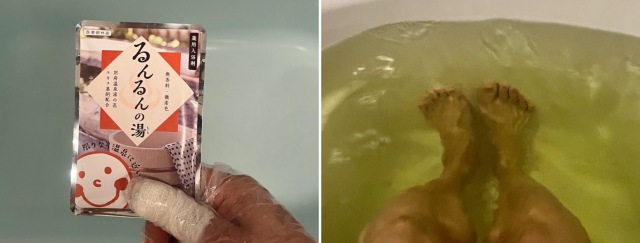
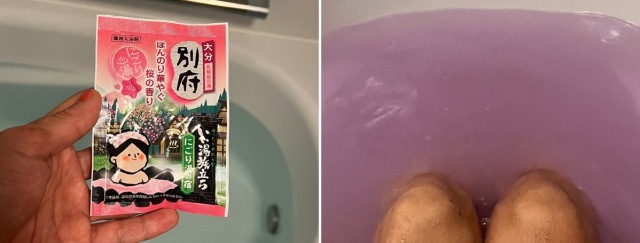
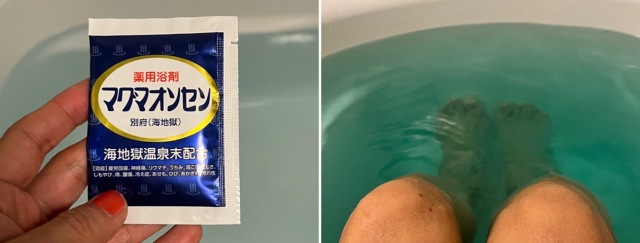
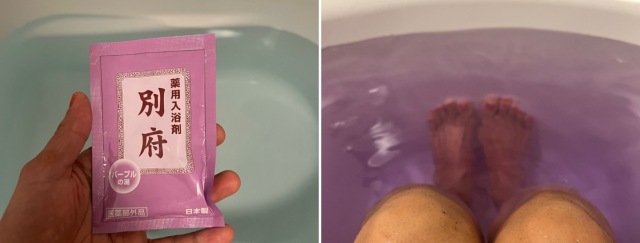
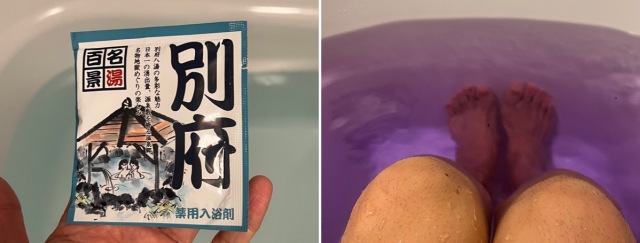
 Famous hot springs of Beppu now offering portable inflatable onsen with authentic Beppu water
Famous hot springs of Beppu now offering portable inflatable onsen with authentic Beppu water Soak in a sand bath in Beppu, Japan’s famous onsen region
Soak in a sand bath in Beppu, Japan’s famous onsen region Oita lures travelers with wonderful montage of synchronized hot spring bathing 【Video】
Oita lures travelers with wonderful montage of synchronized hot spring bathing 【Video】 Eight unforgettable hot springs, as recommended by Japan’s “Professor Bath”
Eight unforgettable hot springs, as recommended by Japan’s “Professor Bath” Check out these cool ways to enjoy hot springs in Oita, including eating and breathing them
Check out these cool ways to enjoy hot springs in Oita, including eating and breathing them Japanese drugstore sells onigiri at pre-stupid era prices, but how do they compare to 7-Eleven?
Japanese drugstore sells onigiri at pre-stupid era prices, but how do they compare to 7-Eleven? Starbucks Japan releases first-ever Hinamatsuri Girls’ Day Frappuccino
Starbucks Japan releases first-ever Hinamatsuri Girls’ Day Frappuccino Japan Extreme Budget Travel! A trip from Tokyo to Izumo for just 30,000 yen [Part 1]
Japan Extreme Budget Travel! A trip from Tokyo to Izumo for just 30,000 yen [Part 1] Ghost in the Sheel goes traditional with Japanese porcelain Tachikoma robots, only 50 to be made
Ghost in the Sheel goes traditional with Japanese porcelain Tachikoma robots, only 50 to be made As more foreign visitors visit Kyoto’s top sights, Japanese travelers increasingly staying away
As more foreign visitors visit Kyoto’s top sights, Japanese travelers increasingly staying away Here comes a new katsudon: ice cream katsudon?!?
Here comes a new katsudon: ice cream katsudon?!? Denny’s new Japanese parfait looks totally different depending on what angle you look at it from
Denny’s new Japanese parfait looks totally different depending on what angle you look at it from 7-Eleven Japan’s sakura sweets season is underway right now!
7-Eleven Japan’s sakura sweets season is underway right now! Ginza Cozy Corner releases “Hanami Party” mini cakes and treats for sakura cherry blossom season
Ginza Cozy Corner releases “Hanami Party” mini cakes and treats for sakura cherry blossom season How to make a lucky sushi roll with KFC fried chicken skin【SoraKitchen】
How to make a lucky sushi roll with KFC fried chicken skin【SoraKitchen】 The 10 most annoying things foreign tourists do on Japanese trains, according to locals
The 10 most annoying things foreign tourists do on Japanese trains, according to locals Highest Starbucks in Japan set to open this spring in the Tokyo sky
Highest Starbucks in Japan set to open this spring in the Tokyo sky Tokyo Skytree turns pink for the cherry blossom season
Tokyo Skytree turns pink for the cherry blossom season Starbucks Japan releases new sakura goods and drinkware for cherry blossom season 2026
Starbucks Japan releases new sakura goods and drinkware for cherry blossom season 2026 Japan’s new “Cunte” contact lenses aren’t pronounced like you’re probably thinking they are
Japan’s new “Cunte” contact lenses aren’t pronounced like you’re probably thinking they are Shibuya Station’s Hachiko Gate and Yamanote Line stairway locations change next month
Shibuya Station’s Hachiko Gate and Yamanote Line stairway locations change next month Yakuzen ramen restaurant in Tokyo is very different to a yakuza ramen restaurant
Yakuzen ramen restaurant in Tokyo is very different to a yakuza ramen restaurant Starbucks Japan adds new sakura Frappuccino and cherry blossom drinks to the menu
Starbucks Japan adds new sakura Frappuccino and cherry blossom drinks to the menu Japan just had its first same-month foreign tourist decrease in four years
Japan just had its first same-month foreign tourist decrease in four years Burning through cash just to throw things away tops list of headaches when moving house in Japan
Burning through cash just to throw things away tops list of headaches when moving house in Japan Japan’s newest Shinkansen has no seats…or passengers [Video]
Japan’s newest Shinkansen has no seats…or passengers [Video] Foreigners accounting for over 80 percent of off-course skiers needing rescue in Japan’s Hokkaido
Foreigners accounting for over 80 percent of off-course skiers needing rescue in Japan’s Hokkaido Super-salty pizza sends six kids to the hospital in Japan, linguistics blamed
Super-salty pizza sends six kids to the hospital in Japan, linguistics blamed Starbucks Japan unveils new sakura Frappuccino for cherry blossom season 2026
Starbucks Japan unveils new sakura Frappuccino for cherry blossom season 2026 Foreign tourists in Japan will get free Shinkansen tickets to promote regional tourism
Foreign tourists in Japan will get free Shinkansen tickets to promote regional tourism Take a trip to Japan’s Dododo Land, the most irritating place on Earth
Take a trip to Japan’s Dododo Land, the most irritating place on Earth Naruto and Converse team up for new line of shinobi sneakers[Photos]
Naruto and Converse team up for new line of shinobi sneakers[Photos] Is China’s don’t-go-to-Japan warning affecting the lines at a popular Tokyo gyukatsu restaurant?
Is China’s don’t-go-to-Japan warning affecting the lines at a popular Tokyo gyukatsu restaurant? Survey asks foreign tourists what bothered them in Japan, more than half gave same answer
Survey asks foreign tourists what bothered them in Japan, more than half gave same answer Japan’s human washing machines will go on sale to general public, demos to be held in Tokyo
Japan’s human washing machines will go on sale to general public, demos to be held in Tokyo Starbucks Japan releases new drinkware and goods for Valentine’s Day
Starbucks Japan releases new drinkware and goods for Valentine’s Day We deeply regret going into this tunnel on our walk in the mountains of Japan
We deeply regret going into this tunnel on our walk in the mountains of Japan Studio Ghibli releases Kodama forest spirits from Princess Mononoke to light up your home
Studio Ghibli releases Kodama forest spirits from Princess Mononoke to light up your home Major Japanese hotel chain says reservations via overseas booking sites may not be valid
Major Japanese hotel chain says reservations via overseas booking sites may not be valid Put sesame oil in your coffee? Japanese maker says it’s the best way to start your day【Taste test】
Put sesame oil in your coffee? Japanese maker says it’s the best way to start your day【Taste test】 No more using real katana for tourism activities, Japan’s National Police Agency says
No more using real katana for tourism activities, Japan’s National Police Agency says Free onsen! Kyushu resort shipping hot spring water to homes across Japan in thank-you program
Free onsen! Kyushu resort shipping hot spring water to homes across Japan in thank-you program Japanese mayor responds to public after “spamusement park” onsen video reaches 1 million views
Japanese mayor responds to public after “spamusement park” onsen video reaches 1 million views The 10 best Japanese hot spring resorts locals want to go back to again and again
The 10 best Japanese hot spring resorts locals want to go back to again and again Solaniwa Onsen: Kansai’s largest hot spring theme park is also one of its most beautiful
Solaniwa Onsen: Kansai’s largest hot spring theme park is also one of its most beautiful Is the fountain of youth located in Japan? New study supports beauty claims of famous Japanese hot spring
Is the fountain of youth located in Japan? New study supports beauty claims of famous Japanese hot spring Japan’s most famous hot spring resort runs ad telling us to go to…a different hot spring resort
Japan’s most famous hot spring resort runs ad telling us to go to…a different hot spring resort Take the “Public” Out of Public Bathing and Make a Natural Hot Spring in the Comfort of Your Own Home
Take the “Public” Out of Public Bathing and Make a Natural Hot Spring in the Comfort of Your Own Home How to have a Japanese rotenburo bath experience without leaving your home【Photos】
How to have a Japanese rotenburo bath experience without leaving your home【Photos】 Japan’s hot spring amusement park has opening date, wants 100 million yen in crowdfunding money
Japan’s hot spring amusement park has opening date, wants 100 million yen in crowdfunding money Hyotan Onsen – Japan’s only hot spring with three Michelin stars
Hyotan Onsen – Japan’s only hot spring with three Michelin stars Japan’s hot-spring capital Beppu made quite possibly the best tourism video ever
Japan’s hot-spring capital Beppu made quite possibly the best tourism video ever Taking a trip using Japan’s random gacha capsule airplane ticket discount【Photos】
Taking a trip using Japan’s random gacha capsule airplane ticket discount【Photos】 Bathe in the waters of a rare Japanese onsen temple steeped in over 1,000 years of history
Bathe in the waters of a rare Japanese onsen temple steeped in over 1,000 years of history Japan’s onsen amusement park begins crowdfunding campaign with awesome returns for investors
Japan’s onsen amusement park begins crowdfunding campaign with awesome returns for investors Dog’s Onsen: Give your pet a traditional Japanese hot spring bath
Dog’s Onsen: Give your pet a traditional Japanese hot spring bath Bathe with Japan’s famous hot spring monkeys in the comfort of your home with these tub stickers
Bathe with Japan’s famous hot spring monkeys in the comfort of your home with these tub stickers